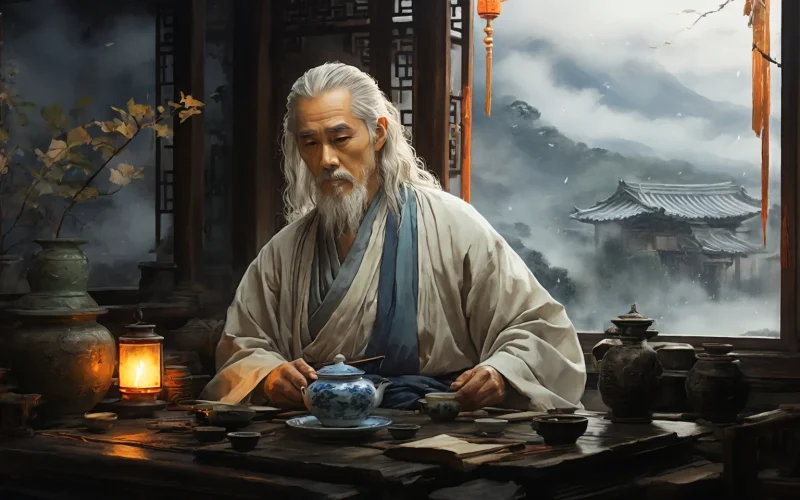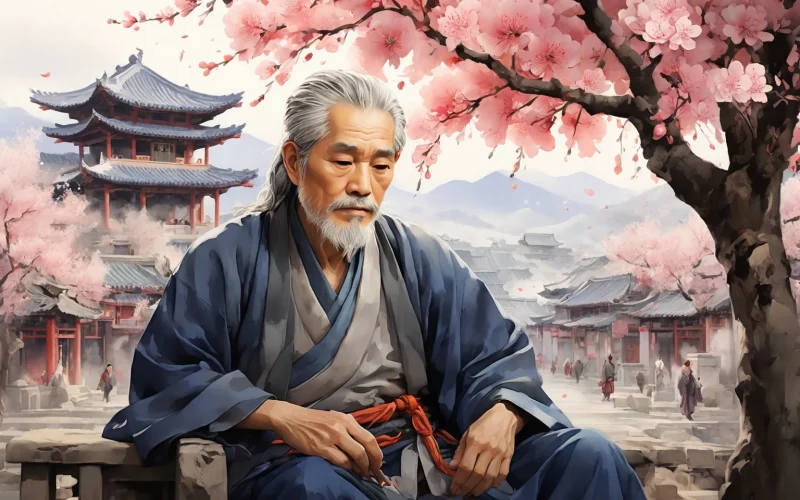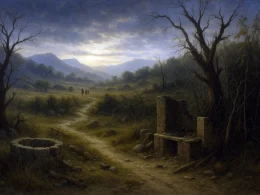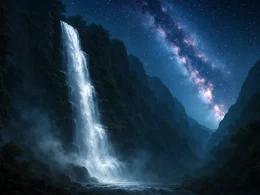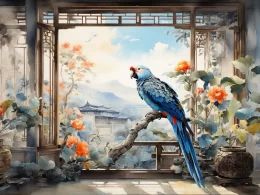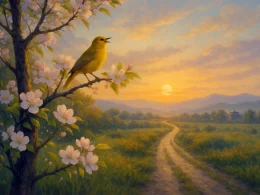Sitting alone, I grieve over my hair white;
In empty room it approaches midnight.
With the rain I hear in the mountain fruit fall;
By lamplight the insects chirp in my hall.
I cannot blacken my white hair while old,
Nor can I turn a metal into gold.
If you want to get rid of ills of old age,
You can only learn from the Buddhist sage.
Original Poem
「秋夜独坐」
王维
独坐悲双鬓,空堂欲二更。
雨中山果落,灯下草虫鸣。
白发终难变,黄金不可成。
欲知除老病,唯有学无生。
Interpretation
This poem was written during the later years of Wang Wei’s life, when he had become a devout follower of Buddhism. The poem reflects his deep contemplation on life, aging, illness, and Buddhist philosophy. After the An Shi Rebellion, Wang Wei began earnestly practicing Buddhism, and in times of physical and mental exhaustion, he turned his focus to Zen meditation and Buddhist thought. The poem, titled “Sitting Alone on an Autumn Night,” describes his experience of sitting in solitude, reflecting on life during an autumn rainy night.
First Couplet: “独坐悲双鬓,空堂欲二更。”
(I sit alone in an empty hall, feeling sorrowful as my hair turns white, and the night approaches the second watch.)
These lines express the poet's lament over aging. Alone in the quiet night, he feels the passing of time and the inevitability of growing old, experiencing deep sorrow for life’s solitude and the unavoidable process of aging.
Second Couplet: “雨中山果落,灯下草虫鸣。”
(The fruits fall in the mountains during the rain, and under the lamp, the grasshoppers chirp.)
These lines depict the falling fruits in the autumn rain and the chirping insects under the light, illustrating the indifference of nature and the fragility of life. The fleeting lives of these insignificant creatures mirror the poet’s own sense of helplessness, enhancing the feeling of solitude.
Third Couplet: “白发终难变,黄金不可成。”
(White hair cannot be changed, and gold cannot be made into immortality.)
These lines express the poet’s skepticism and rejection of Taoist pursuits of immortality. No matter how much one strives, aging is irreversible, and even gold cannot be transformed into something eternal, suggesting the futility of seeking immortality through alchemy or other means.
Fourth Couplet: “欲知除老病,唯有学无生。”
(If one wishes to rid themselves of old age and illness, they must learn the path to "no life" through Buddhism.)
These lines reveal the poet’s realization of Buddhist philosophy, indicating that the suffering of life arises from the cycle of birth and death. Only through the practice of Buddhism can one transcend the suffering of aging, illness, and death, reaching the state of "no life."
Writing Features
The writing of this poem is characterized by its portrayal of the poet’s contemplation on the impermanence of life and the aging process. The first half of the poem is rich in detailed imagery, conveying the poet’s sadness and loneliness over the passage of time. The second half shifts toward rational reflection, introducing Buddhist philosophy and addressing the significance of life, death, and enlightenment. The first half is vivid and emotionally charged, while the latter part, more rational in tone, focuses on explaining the Buddhist concepts of mortality and awakening.
Overall Appreciation
The poem presents the poet's journey from sorrow and contemplation to Buddhist enlightenment. The first two couplets illustrate the poet's deep feelings of aging and solitude, while the latter two turn to philosophical reflection, expressing his quest for the meaning of life and his reliance on Buddhist teachings. By contrasting the natural world with human destiny, the poem poignantly reveals the cruelty of time and the fragility of humanity when faced with the limits of life. Though the second half carries a somewhat didactic tone, it also conveys the poet’s deep understanding of life's suffering and the spiritual solace he finds in Buddhism.
Insights
This poem teaches us that when facing the impermanence of life and the inevitability of aging, there is no need to be overly sorrowful or fearful. Life inevitably involves birth, aging, illness, and death, but through spiritual practice and transcendence, we can find inner peace and wisdom. The poet’s introspection demonstrates the profound relationship between humanity, nature, life, and death, reminding us to seek deeper spiritual fulfillment and enlightenment within the finite time we have.
Poem translator
Xu Yuanchong (许渊冲)
About the poet

Wang Wei (王维), 701 - 761 A.D., was a native of Yuncheng, Shanxi Province. Wang Wei was a poet of landscape and idylls. His poems of landscape and idylls, with far-reaching images and mysterious meanings, were widely loved by readers in later generations, but Wang Wei never really became a man of landscape and idylls.





